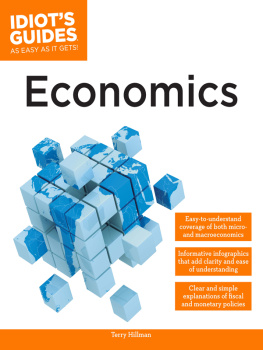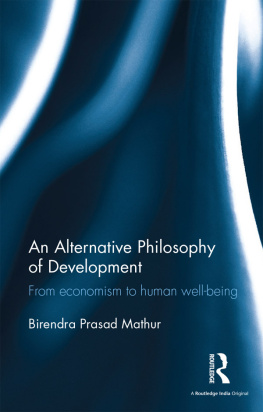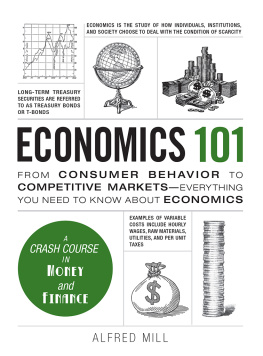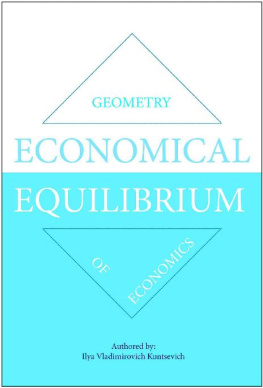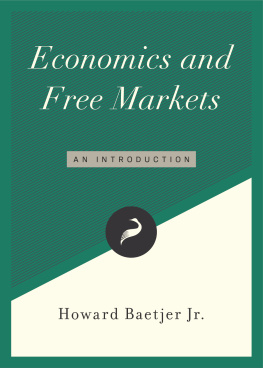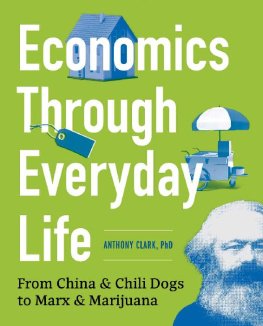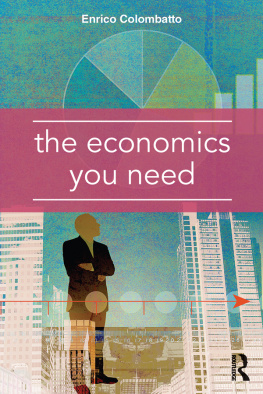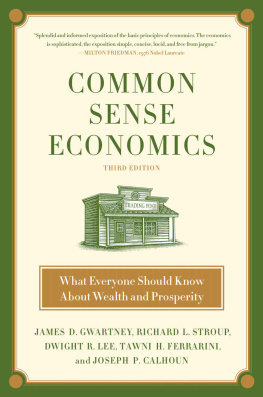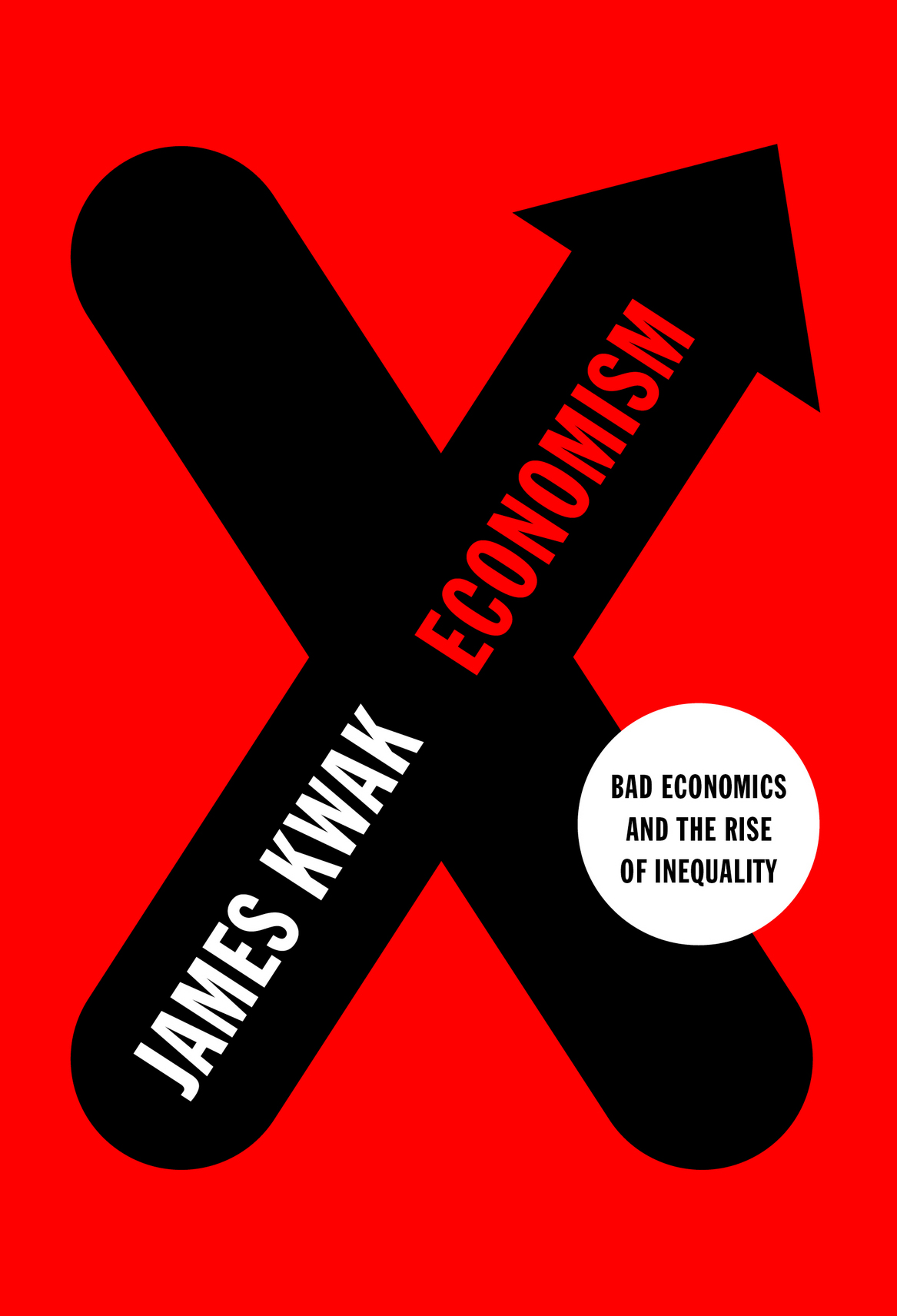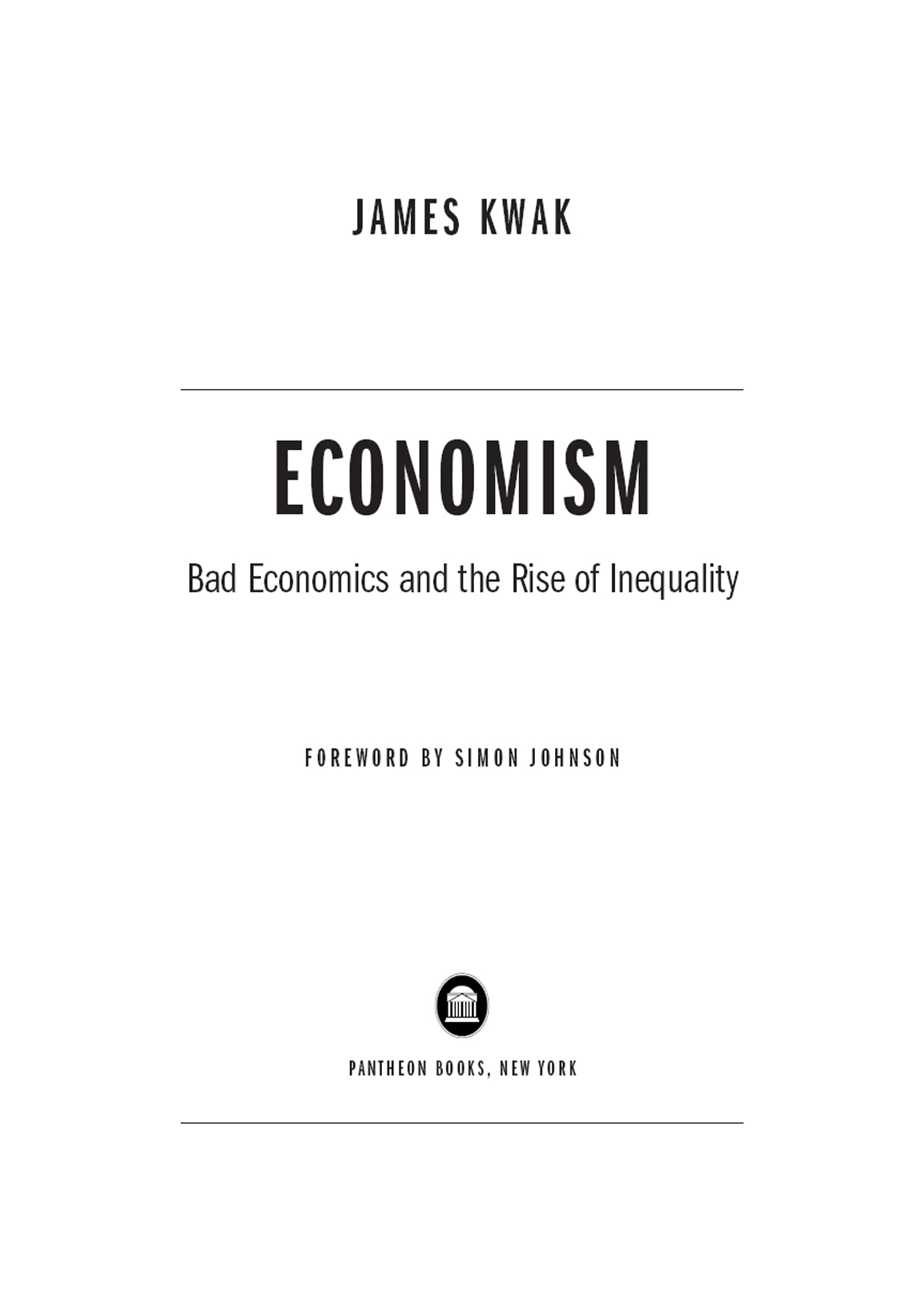ALSO BY JAMES KWAK
(with Simon Johnson)
White House Burning
13 Bankers
Copyright 2017 by James Kwak
Foreword 2017 by Simon Johnson
All rights reserved. Published in the United States by Pantheon Books, a division of Penguin Random House LLC, New York, and distributed in Canada by Random House of Canada, a division of Penguin Random House Canada Limited, Toronto.
Pantheon Books and colophon are registered trademarks of Penguin Random House LLC.
Library of Congress Cataloging-in-Publication Data
Name: Kwak, James, author.
Title: Economism : bad economics and the rise of inequality / James Kwak.
Description: First edition. New York : Pantheon Books, [2016]. Includes bibliographical references and index.
Identifiers: LCCN 2016024099. ISBN 9781101871195 (hardcover : alk. paper). ISBN 9781101871201 (ebook).
Subjects: LCSH: Economics. EconomicsSociological aspects. EconomicsUnited States. Economic policy. United StatesEconomic policy.
Classification: LCC HB71 .K893 2016. DDC 330dc23. LC record available at lccn.loc.gov/2016024099.
Ebook ISBN9781101871201
www.pantheonbooks.com
Cover design by Janet Hansen
v4.1
a
For Sylvia, my favorite economist
My dear brothers, never forget, when you hear people praising the advances of the Enlightenment, that the Devils greatest trick is convincing you that he does not exist!
Charles Baudelaire
Contents
Foreword
by Simon Johnson
Why are we so angry? Prospective international trade agreements attract widespread objections, attempts to balance budgets draw thousands into the streets, and people are outraged about issues such as pollution, corruption, and the power of big banks. Protest votes of all kinds are growing in number, and frustration with our economic system seems to be spreading across much of the world. Yet according to basic economics, wecitizens of the worldhave never had it so good.
The fundamental intuition of economics is simple and powerful: markets are good, and free exchange without coercion and based on strong property rights is even better. The government, in this view, mostly just gets in the way.
Since at least 1980, government has been in retreat in the United States and many other relatively rich countries. This change became more global with Chinas gradual shift away from central planning and with the sudden collapse of the Soviet Union in 1991. Globalizationmeaning freer trade in goods and services but also greater mobility for capital and ideashas become the prevailing paradigm of this century.
We have experienced episodes of greater cross-border integration before, including in the late nineteenth century, when more than forty million Europeans crossed the oceans to find better opportunities, along with more personal freedom and security. And we should not exaggerate the importance of the latest technological innovations; after all, the biggest shrinking of distance arrived more than 150 years ago with railroads, steamships, and the telegraph. Still, recent decades have undoubtedly brought us closer than ever together as a world. And, more than ever, we transact with each other through national and international markets in which there is little or no government intervention.
There is a lot of truth to the idea that free markets can produce good outcomes. If you have a brilliant new technical idea, you can persuade a U.S. venture capitalist to fund it, you can hire engineers from around the world to build it, and you can pay a company in a faraway country to mass-produce it. Look at your TV, your laptop, and (everyones favorite piece of modern technology) your mobile phone; they all came to you along some version of this route.
But, as James Kwak explains carefully in this book, there is a catch, and it turns out to be a big one. The way we typically think and talk about economics is seriously incomplete. This problemhiding in plain sightincreasingly distracts or even blinds us, particularly when it comes to assessing public policy options.
The market is a great mechanism for allocating resources. You prefer one type of mobile phone over anotherperhaps you abandoned BlackBerry for an iPhoneand this sends a powerful signal. Apples profits increase, and it produces more phones. This creates jobs both in the United States, where Apple workers earn good wages, and in the countries where assembly takes place (partly in China). The American consumer gains, and so does the American and the Chinese worker. People working at the Canadian company that produces BlackBerry smart phones have obviously done less well. But in a properly functioning market economy, they get new good jobs elsewhere in the tech sector or (until recently) in the booming Canadian energy sector. In terms of the elegant workhorse models that all professional economists have deeply imprinted on their brains, resourcescapital and peoplemove smoothly between sectors. Economic growth brings higher incomes and better opportunities.
Except of course when it doesnt. The failure of growth to translate into higher living standards has been the bitterly disappointing experience of recent decades for many people in the United States and other industrialized countries.
If you only know about very basic economicsperhaps the first year of a university textbook, without paying attention to any of the nuancethe answer would be remove any and all government intervention and everything will get better. The paradigm of more markets is a powerful pedagogical allegory that has impressed many people, including those who now hold the reins of power in the United States. But stopping with only the simplest economic concepts not only gives you an incomplete picture of how the world works; it is also seriously misleading. The most basic introductory framework is really only a reference point around which more accurate description and analysis are built.
Economists disagree just as much as other people. And there are profound arguments about public policyincluding many issues covered in this bookin which people with impressive credentials are on both sides of the debate. But a great deal of economics research in recent decades has established at least five main modifications to the Economics 101 view of the world. There is more on each of these and related topics in this book, but here are some points to whet your appetite.
First and perhaps foremost, people do not make decisions in the hyperrational mannerbased on full and accurate informationthat underlies Economics 101. Government intervention makes a lot more sense when people would not otherwise become well-informed, for example regarding the precise nature of risks in the financial securities that they buy. (This was a big problem in the 1930s and again in 2008.) The next time you see an advertisement from a for-profit university (or a nonprofit, for that matter) look very carefully at what it is claiming, and then check the specifics against what the Department of Education says are the actual results. When we make infrequent complex decisionsabout mortgages, education, pension savings, or health carewe often get it wrong and end up being overcharged, or worse.


